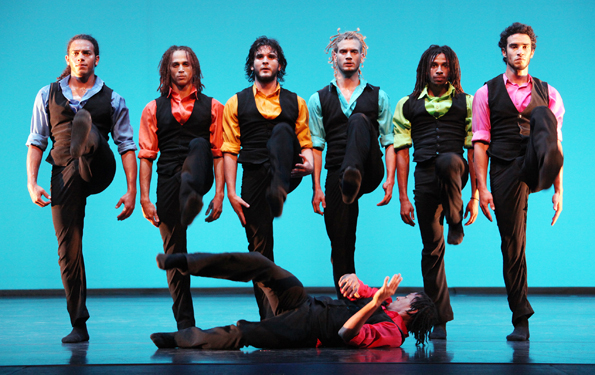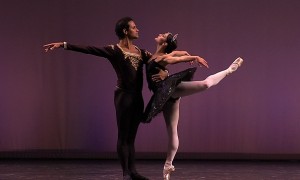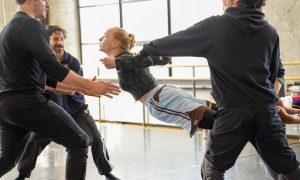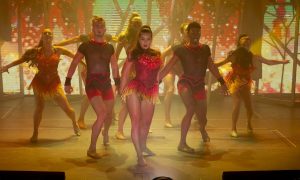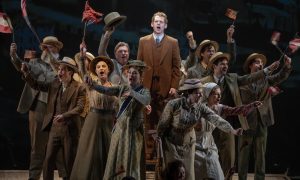Playhouse, QPAC, Australia
Review of Program 1
14-18 September, Brisbane Festival 2010
By Elizabeth Ashley.
The Baby Cubans
Brisbane had the privilege to present exclusively both the Ballet Naçional de Cuba and Danza Contemporánea de Cuba, affectionately nicknamed the ‘Big Cubans’ and the ‘Baby Cubans’, as part of its 2010 festival line-up.
Both companies formed during the revolution of 1959, but while the ‘Big Cubans’ have enjoyed world-wide acclaim for many years, it was not until international choreographers were commissioned to collaborate with Danza Contemporánea that the ‘Baby Cubans’ gained enthusiastic recognition outside of Cuba.
Audiences experienced this collaboration in Program 1 with Demo-n/Crazy by Rafael Bonachela, Carmen by Kenneth Kvaström and Mambo 3XXI by Cuban choreographer and dancer George Céspedes. In Program 2, Carmen is replaced by Jan Linkens’ Folia.
Bonachela’s Demo-N/Crazy opens Program 1. The stark simplicity of minimally clothed dancers on a bare stage provides the perfect setting for the highly demanding and complex choreography. Tactile intimacy dominates – bodies embrace and touch, fold and unfold as relationships form and dissolve. Boldly the dancers launch themselves into space with an animal-like fatalism, leaving both dancers and the audience breathless. Bonachela explains ‘These dancers have the technique of Martha Graham with Afro-Cuban rhythm…they are totally fearless.’
Dance is the powerful medium of communication in this relational exploration that moves from poignancy to witty, camp comedy.
The title Demo-N/Crazy is a play on words inspired by the crazy recklessness of the Cubans and one of the soundtracks; Julia Wolfe’s ‘Arsenal of Democracy.’ This violin/techno music combined with the pathos of Estrella Morente’s flamenco soundtrack of ‘Ne me Quitte pas’ provides contrasting musical moods.

A perfect antidote to Bonachela’s dynamic intensity and grounded lyricism is the wonderfully entertaining spoof of the Spanish opera ‘Carmen’ by Scandinavian choreographer Kenneth Kvaström. Imagine a Paso Doble designed by a slightly mad, gay uncle who loves West Side Story.
The work is performed by 7 male dancers dressed in their best (and tightest) black pants, waistcoats and jewel-coloured satin shirts who parody card-playing, panatella-smoking, sex-obsessed Spanish macho-men.
The witty piece showcases the dancers’ versatility as they perform perfect classical arabesques, lunges and sweeping arms as well as bravado-style flamenco footwork, cheeky hip-swinging and blatantly camp moves.
Appropriately, the closing performance, Mambo 3XXI by George Céspedes, is the most Cuban. Remixing the music of Perez Prado with seventies disco, electronica and trip-hop creates a streetwise ambience – Mambo for the 21st Century.
It opens with geometric lines of dancers breaking into various patterns whilst accentuating the quick footwork of the traditional mambo. The distinctive Cuban body types and rhythmic facility are a joy to behold. One feels only a Cuban company could perform this choreography with the right balance of seriousness and natural abandon.
Throughout most of Mambo 3XXI all 21 company dancers are on stage creating a sense of rush; the crowded and public nature of modern life. Thematically the dance is the continuous search for relationships within that life.
Festival Artistic Director, Noel Staunton says ‘Danze Contemporánea de Cuba…write their own rules and dance to a completely unique beat and flourish.’ The ‘Baby Cubans’ are certainly the revolutionary face of Cuban dance and could well outshine the more illustrious ‘Big Cubans’.
Photos by Justin Nicholas
Published by www.danceinforma.com


